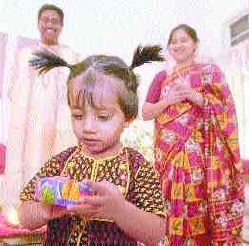 Rich Abrahamson/The Coloradoan GIFT GIVING: Ananya Deshpande, 2, admires a present given to her during a Diwali celebration held Monday at the home of Rajiv and Reena Khosla in southeast Fort Collins. Pictured in the background are Ananya's parents Rahul, left, and Jayanthi.
Interested?
The India Association of Northern Colorado, or IANC, is hosting Diwali Nite at 6 p.m. Saturday at the Fort Collins Senior Center, 1200 Raintree Drive. Tickets are $12 for IANC members, $18 for nonmembers, $10 for seniors, $6 for children ages 6-12 and free for children ages 5 and under. The featured speaker is Coloradoan publisher Dorothy Bland. Tickets are available at the Empire Conoco on Shields Street and Center Avenue and from any IANC executive committee members. For more information, call Rahul Deshpande at 223-4211 or send an e-mail to ianc_fortcollins@yahoo .com or visit the IANC Web site at www.ianc-fc.org/
|
Strings of lights graced the home of Rajiv and Reena Khosla of Fort Collins this week.
The family wasn't getting a jump on Christmas. The lights were strung to celebrate one of the biggest holidays in the Hindu calendar, Diwali, known as the "festival of lights."
"The literal meaning of the word is a string of lights. We lit up candles and I made a lot of sweets to exchange," Reena Khosla said. "In India, we would light up firecrackers."
The Khoslas invited friends over Monday to celebrate. These included Rahul and Jayanthi Deshpande and their daughter.
"The festival represents the winning of good over evil. That's why light is so important," Rahul said.
The five-day festival commemorates the return of King Rama, an incarnation of the Hindu god Vishnu, who pursued and slew a demon king who had abducted his wife and taken her to Sri Lanka. His whole kingdom celebrated his return.
Although the festival ended Tuesday, the India Association of Northern Colorado is hosting a citywide Diwali celebration Saturday at the Fort Collins Senior Center. There will be a cultural program that includes music, dance, poetry and skits, and Indian food made by Taj Mahal restaurant will be served.
"You can't call the dance classical dance, but it is inspired by classical dance," Jayanthi said. The performers will also do a dance to a song taken from the Indian movie "Devdas," which was featured at the Cannes Film Festival in France.
An important Diwali custom is to offer prayers to Laxmi, the goddess of wealth. Diwali is a religious holiday, but like Christmas, it has taken on tremendous commercial significance, Rahul said. It's common for Indians to buy new clothes for themselves and their children for the festival.
"In India all the sales are on at this time," Rahul said. "And this starts before Diwlai. It reminds me of Christmas."
Although Indians in the Fort Collins area celebrate Diwali on a smaller scale than they would in India, they want to keep the cultural tradition alive for themselves and their children.
"India is a secular country with a democratic constitution. But these traditions have been around for so long. Indian civilization dates back to at least 1500 B.C," Rahul said.
"It's important to remember these traditions; otherwise they won't continue."
Originally published Thursday, November 7, 2002